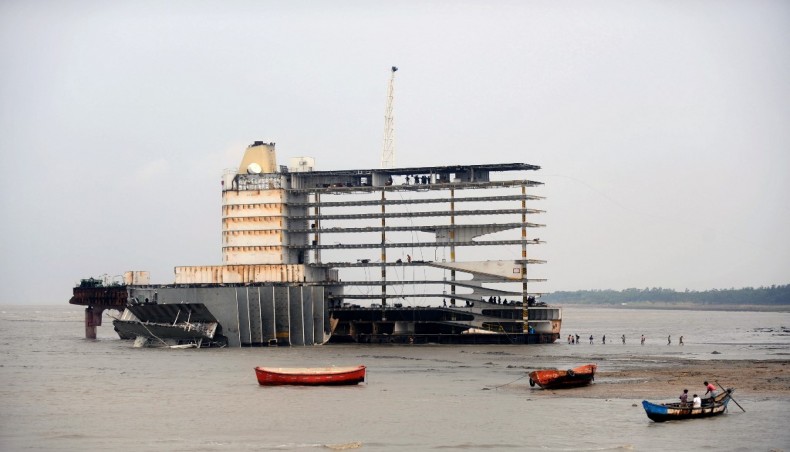New Age Online | Published: Mar 12,2021

An AFP file photo shows the skeletal of a ship at a shipbreaking yard in Shitakundo.
British shipping companies that sell old vessels to be scrapped cheaply in dangerous, low-paid conditions in Bangladesh, India or Pakistan may now be sued in London for workers’ deaths or injuries, reports the Guardian.
In the first ruling of its kind by any higher court anywhere in the world, the court of appeal of England and Wales had held that a shipping company in London selling a vessel in South Asia could owe a legal ‘duty of care’ to shipbreaking workers in Bangladesh even where there were multiple third parties involved in the transaction.
The landmark ruling meant that Hamida Begum whose husband, Khalid Mollah, fell to his death in 2018 while working high up on a 300,000-ton oil tanker on the beach at Chattogram will now be able to sue the shipping company Maran in London.
But by putting the legal spotlight on the notoriously lax environmental and health and safety practices in Bangladesh, the ruling might open the gates for other cases and force Asian shipbreaking yards to improve working conditions.
The ruling followed decisions on two other long-running cases where impoverished communities in low-income countries were also given permission to sue multinational companies or their subsidiaries in London for alleged environmental pollution or damages.
Last month the Supreme Court ruled that a group of Nigerian farmers and fishers could sue Royal Dutch Shell in the English courts over pollution in a region where the Anglo-Dutch energy giant had a subsidiary. Shell had argued that it was not responsible.
In a second landmark ruling, the Supreme Court ruled in 2019 that Zambian villagers could sue UK-based mining conglomerate Vedanta in the English courts for alleged water pollution because, as the parent body of the mining company working in Zambia, it owed the villagers a duty of care and could be held responsible.
An estimated 216 workers had died in the past 15 years at the shipbreaking yards of Chattogram, including seven so far this year. Many more had been disabled or seriously injured.
Work in Chattogram was well-known for being precarious, dirty and dangerous, but shipping companies had been able to avoid responsibility by changing ownership of vessels at the last minute, and using tax havens and middlemen.
Hundreds of people, mostly without contracts, were injured or die every year in falls, explosions and accidents. The coastal environment was heavily polluted with oils, asbestos and dangerous chemicals and few people could work for more than a few years in the intense tropical heat without being physically injured.
London law firm Leigh Day argued that Mollah’s accident was foreseeable and that Maran, which sold the tanker for demolition to a Dubai-based company, would have known it was going to Chattogram for demolition and should have anticipated the risk of injury to workers such as Mollah demolishing it.
Leigh Day contended that the shipping industry took deliberate advantage of Bangladesh’s weak regulations. The result, it argued, was that wealthy ship owners got the highest prices for scrap vessels in the practical certainty that they will be broken up in Bangladesh where health and safety standards were lower than in more expensive but safer yards.
Maran argued that it did not control the ship’s ultimate destination and that there was nothing it could have, or should have, done to avoid the risks to the deceased. But Lord Justice Coulson said: ‘the appellant could, and should, have insisted on the sale to a so-called ‘green’ yard, where proper working practices were in place’.
According to NGO Shipbreaking Platform, more than 70 per cent of approximately 800 vessels that reach the end of their operating lives every year were broken up in Bangladesh, India or Pakistan.
Standard practice was that sales of end-of-life ships were not conducted directly between ship owners and ship breakers themselves, but through demolition cash buyers who assume the credit risk, with the result that ship owners were distanced.
Leigh Day director Martyn Day welcomed the appeal court decision.
‘The English courts have been shown to be sympathetic to these claims by communities whether in Africa or Asia bringing claims against British multinationals. Whether it is oil-spill claims against Shell, mine pollution claims against Vedanta or this claim in relation to shipbreaking, London has proved to be one of, if not the only, capitals in the world where claims can successfully be brought,’ he said.
No comments:
Post a Comment